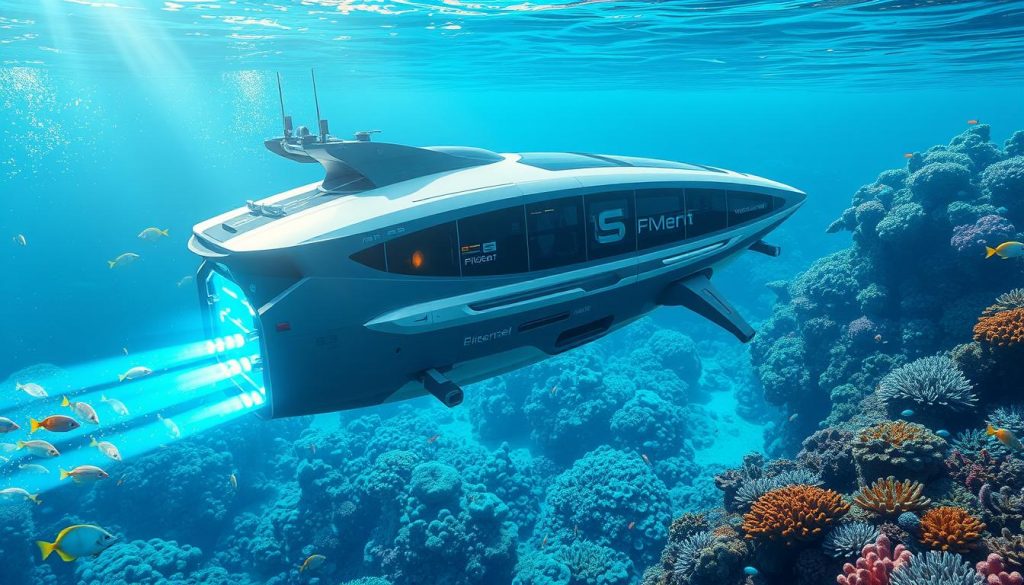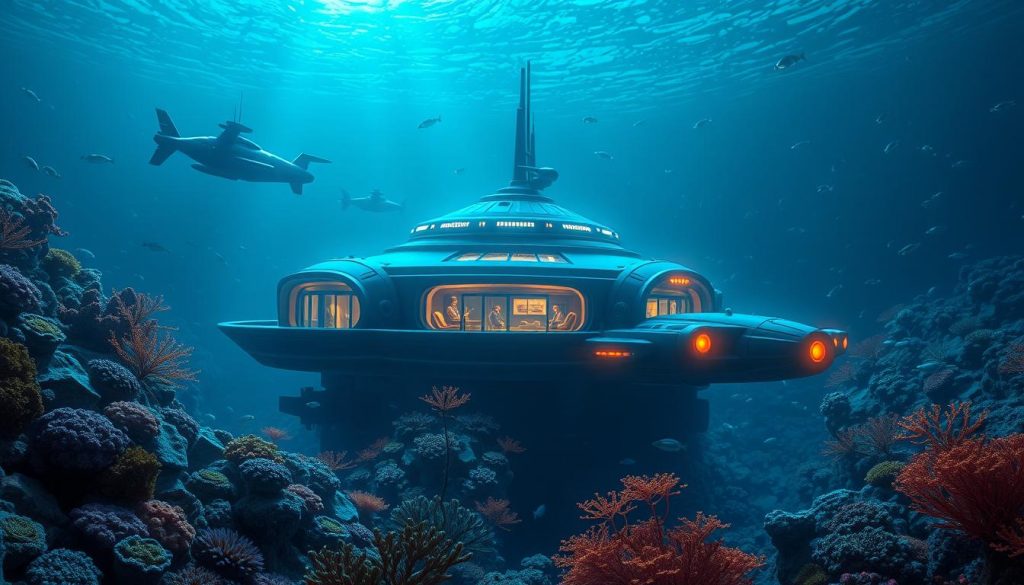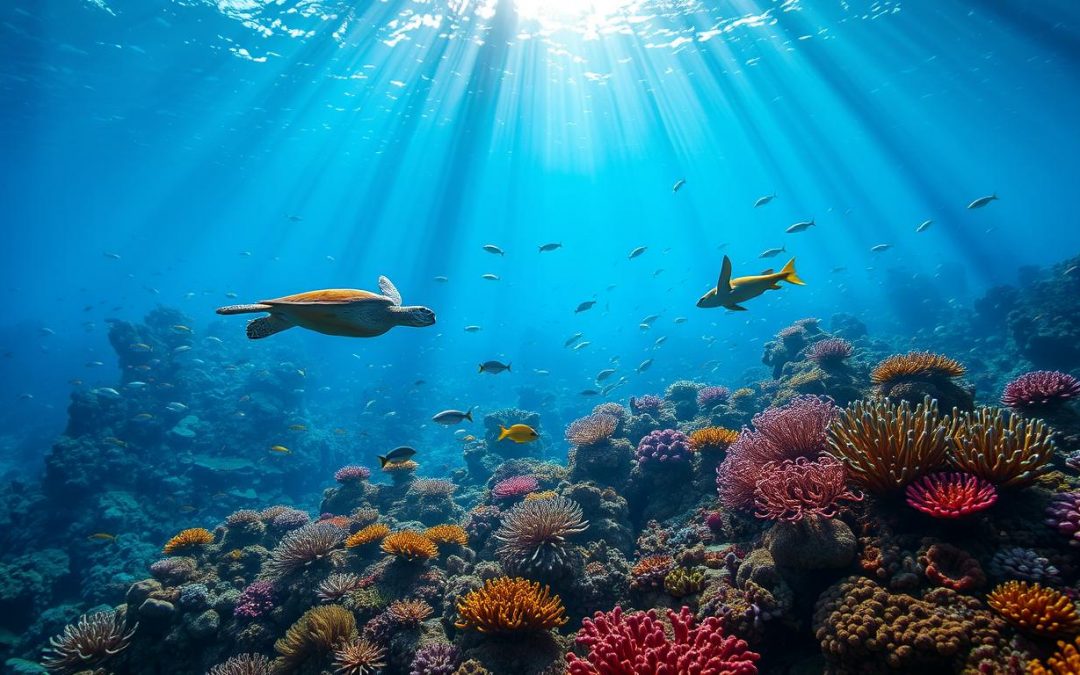Exploring space and the ocean fascinates me. Yet, we seem more drawn to the stars than our own oceans. This is a key part of marine science and ocean exploration.
The first human walked on the Moon in 1969. This was a big step in space exploration1.
Oceans have warmed by over 1.5°C since the Industrial Revolution started. This happened more than 250 years ago2.
It’s time to see why ocean exploration and marine science matter. We should pay more attention to them.
The idea of space exploration began in the early 20th century. This was a time of war, revolution, and economic struggles1.
More than 90% of the extra heat from greenhouse gases goes into the ocean2. This shows we need to focus more on the ocean and marine science.
My Personal Journey into the Space vs. Ocean Debate
I’ve always been drawn to both space and the ocean. I often wondered why we focus more on one than the other. My exploration into this debate started with a simple question: should we explore space or our own ocean first? The ocean makes up about 71% of Earth’s surface3, yet only 5% of it has been explored3.
Our lack of focus on the ocean is not just about choice. It’s also because we don’t fully understand its value. Deep-sea research and underwater discovery are key to our survival. They affect everything from our food to the air we breathe. The deepest parts of the ocean face pressures over 1,000 times higher than sea level4, making it a fascinating field to study.
As I dug deeper, I found out that only 0.05% of the ocean has been mapped well3. By 2021, nearly 80% of the Earth’s oceans were still unexplored or unmapped5. This issue affects us all, and we need to keep exploring through deep-sea research and underwater discovery.
The Current State of Ocean Exploration
Oceanography and marine technology have changed how we explore the ocean. They help us find new species and ecosystems. The ocean covers about 71% of Earth, holds 99% of life, and has 94% of wildlife6.
Only 5% of the ocean has been explored by humans6. Recent tech has let us dive deeper than ever before.
NOAA Ocean Exploration has announced $3 million for ocean projects in FY257. This money will help research, like studying marine debris in the North Atlantic7. They found a huge deep-sea coral reef, bigger than Vermont7.
Ocean exploration keeps getting better. New tech lets us see the ocean in more detail. We learn more about our planet with each discovery.
Combining oceanography and marine tech has greatly improved our ocean knowledge. With more funding, we’ll see even more discoveries. It’s key to keep exploring and protecting the ocean for our planet’s health.
Space Programs vs. Marine Research: A Funding Comparison
Exploring space and the ocean shows a big difference in funding. Space gets much more money than the ocean. NASA has gotten over 10 times more funding than ocean research8. This is concerning, given the ocean’s importance and the discoveries waiting to be made.
The ocean’s research is hindered by a lack of funding. There are few exploration vessels and not enough work on ocean habitats. On the other hand, space programs have made big strides. NASA’s Mars Curiosity Rover has traveled 54.6 million kilometers from Earth, showing a lot of investment8. The ocean community is less unified, with many groups competing for attention8.
Recent polls show 77% of students think ocean exploration is more important than space9. But, the money doesn’t match this view. It’s suggested to split funding equally between space and ocean. This could change based on progress and new technologies9. We need to value ocean exploration and give it the resources it deserves for a fair exploration effort.
Why We’re Drawn to Space: The Psychology Behind Looking Up
Reflecting on space and the ocean, I see a paradox. Why do we focus more on space than the ocean? The allure of space is strong, with many drawn to exploring the unknown. But what’s behind this fascination? Is it the hope of finding new worlds, the excitement of adventure, or something more?
Marine science offers clues. It shows our brains are wired for the thrill of discovery10.
Exploring space comes with a high price tag. A trip to the edge of space by Blue Origin costs $28 million11. On the other hand, ocean exploration is more affordable. Victor Vescovo offers dives in his submersible, Limiting Factor, for $750,00011. As we explore why we’re drawn to space, we might find a mix of emotions. These include a desire for exploration and a need for escapism.
Understanding these motivations helps us see the value of ocean exploration in our lives. The sea floor near Santa Barbara drops to 500 meters (1,640 feet) before rising again11. This offers a unique chance for research and discovery. As we explore both the ocean and space, we might find they’re more connected than we think. Marine science could help us understand the universe and our place in it10.
The Hidden Wonders of Deep-Sea Research
Exploring the deep-sea research world is truly eye-opening. The deep sea covers over 60% of Earth’s surface12. Yet, it’s still a vast, unexplored area. Recent underwater discoveries highlight the deep sea’s importance, revealing new species and ecosystems12.
The deep sea holds endless possibilities for discovery. We must keep exploring to learn more about our oceans. Thanks to advanced tech, like submersibles and robots, we can now dive deeper than ever before12. Creatures like the giant squid and Yeti crab live in these extreme conditions12.
As we delve deeper, we might find new ocean territories. Each one could bring new discoveries and scientific breakthroughs12. The United Nations has launched a decade-long plan to boost deep-sea research from 2021 to 203012. It’s an exciting era for underwater discovery, and I’m looking forward to what’s next.
Technology Gaps: Marine Vessels vs. Space Shuttles
There’s a big gap in marine technology compared to space exploration. The ocean’s average depth is about 3,800 meters. The pressure is 380 times what we feel at sea level13. This makes it hard for marine vessels to withstand, unlike space shuttles in a vacuum.
Oceans cover 71% of our planet, but only 1% has been explored14. This is because marine vessels can’t keep up with space shuttles. They face issues like corrosion, pressure, and navigating deep waters.
New materials and designs are helping underwater exploration. For example, syntactic foam is used in vehicles like ROV Jason and AUV Sentry13. NASA has also been studying oceans from space for over 20 years. They provide data on ocean habitats and help predict events like El Niño15.

The gap between marine vessels and space shuttles is big. But, by focusing on marine technology, we can close it. This will help us understand ocean habitats better13. It will also aid in conserving and using marine resources sustainably.
The Economic Potential of Ocean Exploration
Ocean exploration opens up a world of economic possibilities. The ocean, covering about 70% of Earth, is crucial for our survival and economy16. It affects air quality, food, and climate16. The deep sea also supports fisheries, creating jobs and food17.
Exploring the ocean offers more than just fish. It could lead to finding oil, gas, and minerals, opening up new economic doors17. We might also discover new medicines, food, and energy sources16. This could create jobs and drive innovation in the blue economy.
The economic growth potential is huge. We must focus on exploring the ocean to tap into its wealth. By investing in marine science, we can foster sustainable development and new industries18. This will improve lives globally. As we explore, we must remember the ocean’s role in our economy and its health.
Environmental Impact: Why Ocean Research Matters Now
Exploring the ocean’s importance, I see how vital ocean habitats are for our planet. They absorb carbon dioxide and heat, thanks to exploration vessels that help us learn more19. Yet, human actions harm marine life, leading to biodiversity loss and species extinction19.
The ocean faces big challenges from human activities, especially ocean acidification. Since the 1700s, the ocean’s acidity has risen by 30% on average20. This harms marine life, especially those with calcium carbonate shells. The cost of mollusk-production losses could hit $100 billion worldwide20.
To lessen human impact, we must focus on ocean research and conservation. By studying marine resources like aquaculture and renewable energy, we can avoid harmful practices21. New technologies, like exploration vessels, aid in understanding and safeguarding ocean habitats19.
Breaking Down the Barriers to Deep-Sea Discovery
Exploring the ocean is a big challenge. We need better technology to do it. But, new tools like the Maka Niu platforms are making it cheaper and easier. They can dive 5,000 feet and cost less than $1,000 each22.
Working together is also key. We need people from different fields to help. For example, a study used sensors to measure the ocean’s conditions. It involved 28 groups working together22.

Finding money and facing political hurdles are also big challenges. But, the benefits of exploring the ocean are huge. It could lead to many discoveries that help society23.
People like Sylvia Earle have shown us the importance of never giving up. She has led over 100 expeditions and spent thousands of hours underwater23.
With new tech, funding, and teamwork, we can conquer these challenges. Exploring the deep sea is tough, but we can do it. Together, we can unlock the ocean’s secrets and help our planet2223.
My Vision for Modern Ocean Exploration
Looking at ocean exploration today, I see endless possibilities. Only about 20% of the seafloor is mapped well24. My dream is to explore the ocean while protecting it and the environment.
Using new tech like underwater robots and DNA sampling24, we can start a new chapter in ocean exploration. The ocean, covering over 70% of Earth25, is key to our climate. It helps us understand climate change’s impact on weather24.
Also, marine science could reveal many new species. Scientists think two-thirds of marine life is still unknown24. The ocean’s economy is huge, worth $2.5 trillion yearly26. We must explore the ocean in a way that’s good for both people and the planet.
What We Can Learn From Space Programs to Advance Marine Science
Space exploration is pushing us to new heights, and we can apply these lessons to marine science. The ocean, covering 70% of our planet, is still a mystery27. By using space tech like robots and sensors, we can better understand marine technology and ocean habitats.
Space tech is changing how we explore and study the sea27. For example, Ocean Gliders can travel long distances, gathering data on the ocean’s temperature, salinity, and currents27. This data is key to understanding ocean habitats and their impact from human activities.
AI and robotics are also making a big difference in marine conservation27. They help us monitor and collect data more accurately. This is crucial for protecting marine ecosystems, which are vital for our planet’s health. By learning from space, we can explore the ocean more sustainably, benefiting both humans and the planet.
Space programs also teach us how to engage the public and educate about marine science28. This awareness is essential for protecting ocean habitats. By sharing knowledge and working together, we can advance marine science and ensure a better future for our planet.
Conclusion: Bridging the Gap Between Stars and Seas
We must bridge the gap between the stars and the seas. By using space program lessons in ocean exploration, we can better understand our planet29.
The future of ocean exploration looks bright. We need to protect our oceans while exploring them. The Exxon Valdez oil spill shows how urgent this need is30.
Space programs have shown us how to inspire new explorers. Dr. Sylvia Earle spent over five thousand hours underwater. We must encourage more to explore the ocean’s depths30.
It’s time to focus more on our oceans. With government, research, and public support, we can make a better future for everyone.
Source Links
- The Only Reason to Explore Space
- News: Ocean Exploration News: NOAA Ocean Exploration
- Do we really know more about space than the deep ocean?
- Space vs Ocean: The Science Behind the Easier Journey
- Space Exploration Beats Ocean, or Not?
- How much of the Ocean has been explored?
- News: NOAA Ocean Exploration Updates: NOAA Ocean Exploration
- Ocean vs Space: Exploration and the Quest to Inspire the Public
- Space or Ocean Exploration
- From Deep Ocean To Outer Space…
- Our Deepest Dreams: Why Do We Prioritize Space Over the Mysteries of the Ocean? | The Walrus
- Discovering the Hidden Treasures of Deep-Sea Exploration
- Did you know: How do ocean robots take the pressure?
- Deep Sea vs. Outer Space
- Oceanography – NASA Science
- Why do we explore the ocean? : Ocean Exploration Facts: NOAA Ocean Exploration
- Ocean Exploration Matters
- The Imperative of Ocean Exploration: Challenges and Opportunities in the Caribbean – Compete Caribbean Partnership Facility
- For a More Sustainable Future, We Must Explore and Better Understand What Lies Beneath America’s Ocean Waters | OSTP | The White House
- The Case for Increasing Ocean Exploration
- Boldly Explore Where No One Has Explored Before
- Expanding Access to Global Deep-Sea Exploration | BIOS
- This Trailblazer Shattered Barriers to Deep-Sea Exploration
- See Yourself as an Ocean Explorer
- Envision 2050: The Future of Oceans
- Who we hire to explore the deep sea.
- Innovations in Marine Technology: Changing How We Study the Oceans
- Marine Science Goes to Space – Eos
- E/V Nautilus
- Sylvia Earle’s Underwater Explorations


